Analysis of Entrepreneurial Ventures, Economic Impact, and Traits
VerifiedAdded on 2021/02/19
|15
|4915
|123
Report
AI Summary
This report provides a comprehensive analysis of entrepreneurial ventures, their types, and their impact on the economy. It examines the differences between small businesses, large companies, and social enterprises, highlighting their respective roles in economic development. The report interprets data and statistics to illustrate the impact of micro and small businesses on the economy at local, regional, and national levels. It also explores the importance of small businesses and startups in the growth of the social economy. Furthermore, the report identifies the characteristic traits and skills of successful entrepreneurs, differentiating them from other managers, and assesses how entrepreneurial personalities reflect motivation and mindset. Finally, it uses relevant examples to examine how background and experience can either hinder or foster entrepreneurship, offering a holistic view of the entrepreneurial landscape.

ENTREPRENEURSHIP AND
SMALL BUSINESS
MANAGEMENT
SMALL BUSINESS
MANAGEMENT
Paraphrase This Document
Need a fresh take? Get an instant paraphrase of this document with our AI Paraphraser
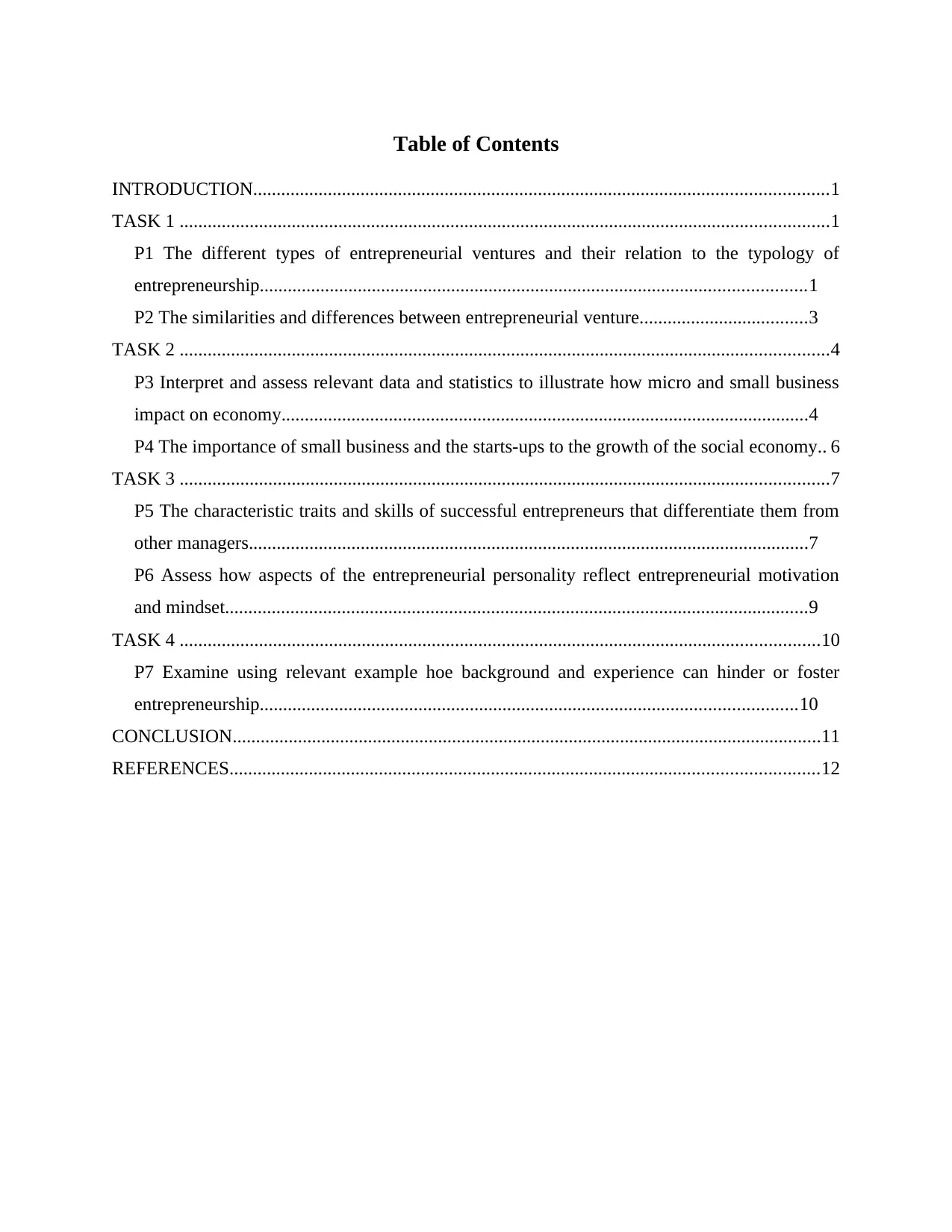
Table of Contents
INTRODUCTION...........................................................................................................................1
TASK 1 ...........................................................................................................................................1
P1 The different types of entrepreneurial ventures and their relation to the typology of
entrepreneurship.....................................................................................................................1
P2 The similarities and differences between entrepreneurial venture....................................3
TASK 2 ...........................................................................................................................................4
P3 Interpret and assess relevant data and statistics to illustrate how micro and small business
impact on economy.................................................................................................................4
P4 The importance of small business and the starts-ups to the growth of the social economy.. 6
TASK 3 ...........................................................................................................................................7
P5 The characteristic traits and skills of successful entrepreneurs that differentiate them from
other managers........................................................................................................................7
P6 Assess how aspects of the entrepreneurial personality reflect entrepreneurial motivation
and mindset.............................................................................................................................9
TASK 4 .........................................................................................................................................10
P7 Examine using relevant example hoe background and experience can hinder or foster
entrepreneurship...................................................................................................................10
CONCLUSION..............................................................................................................................11
REFERENCES..............................................................................................................................12
INTRODUCTION...........................................................................................................................1
TASK 1 ...........................................................................................................................................1
P1 The different types of entrepreneurial ventures and their relation to the typology of
entrepreneurship.....................................................................................................................1
P2 The similarities and differences between entrepreneurial venture....................................3
TASK 2 ...........................................................................................................................................4
P3 Interpret and assess relevant data and statistics to illustrate how micro and small business
impact on economy.................................................................................................................4
P4 The importance of small business and the starts-ups to the growth of the social economy.. 6
TASK 3 ...........................................................................................................................................7
P5 The characteristic traits and skills of successful entrepreneurs that differentiate them from
other managers........................................................................................................................7
P6 Assess how aspects of the entrepreneurial personality reflect entrepreneurial motivation
and mindset.............................................................................................................................9
TASK 4 .........................................................................................................................................10
P7 Examine using relevant example hoe background and experience can hinder or foster
entrepreneurship...................................................................................................................10
CONCLUSION..............................................................................................................................11
REFERENCES..............................................................................................................................12
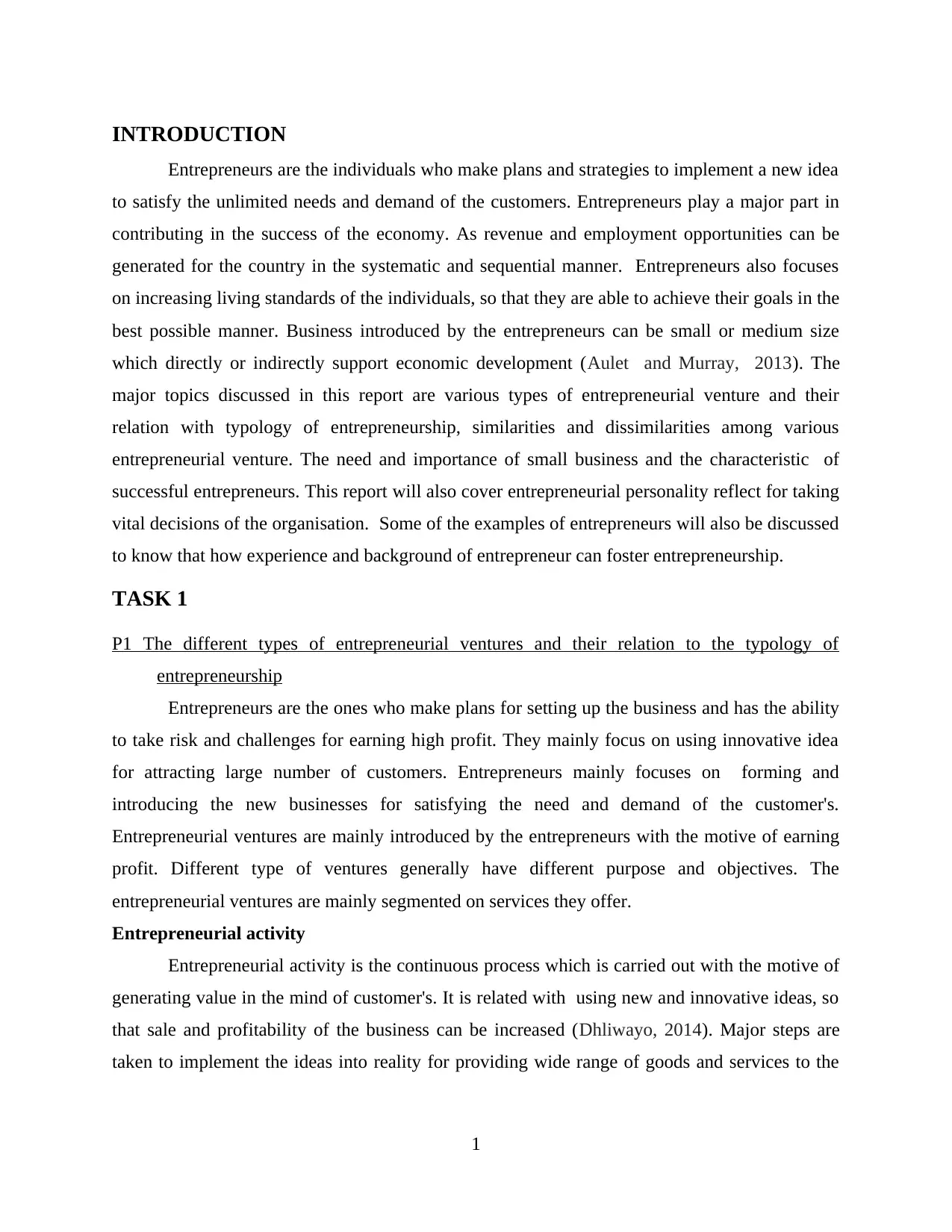
INTRODUCTION
Entrepreneurs are the individuals who make plans and strategies to implement a new idea
to satisfy the unlimited needs and demand of the customers. Entrepreneurs play a major part in
contributing in the success of the economy. As revenue and employment opportunities can be
generated for the country in the systematic and sequential manner. Entrepreneurs also focuses
on increasing living standards of the individuals, so that they are able to achieve their goals in the
best possible manner. Business introduced by the entrepreneurs can be small or medium size
which directly or indirectly support economic development (Aulet and Murray, 2013). The
major topics discussed in this report are various types of entrepreneurial venture and their
relation with typology of entrepreneurship, similarities and dissimilarities among various
entrepreneurial venture. The need and importance of small business and the characteristic of
successful entrepreneurs. This report will also cover entrepreneurial personality reflect for taking
vital decisions of the organisation. Some of the examples of entrepreneurs will also be discussed
to know that how experience and background of entrepreneur can foster entrepreneurship.
TASK 1
P1 The different types of entrepreneurial ventures and their relation to the typology of
entrepreneurship
Entrepreneurs are the ones who make plans for setting up the business and has the ability
to take risk and challenges for earning high profit. They mainly focus on using innovative idea
for attracting large number of customers. Entrepreneurs mainly focuses on forming and
introducing the new businesses for satisfying the need and demand of the customer's.
Entrepreneurial ventures are mainly introduced by the entrepreneurs with the motive of earning
profit. Different type of ventures generally have different purpose and objectives. The
entrepreneurial ventures are mainly segmented on services they offer.
Entrepreneurial activity
Entrepreneurial activity is the continuous process which is carried out with the motive of
generating value in the mind of customer's. It is related with using new and innovative ideas, so
that sale and profitability of the business can be increased (Dhliwayo, 2014). Major steps are
taken to implement the ideas into reality for providing wide range of goods and services to the
1
Entrepreneurs are the individuals who make plans and strategies to implement a new idea
to satisfy the unlimited needs and demand of the customers. Entrepreneurs play a major part in
contributing in the success of the economy. As revenue and employment opportunities can be
generated for the country in the systematic and sequential manner. Entrepreneurs also focuses
on increasing living standards of the individuals, so that they are able to achieve their goals in the
best possible manner. Business introduced by the entrepreneurs can be small or medium size
which directly or indirectly support economic development (Aulet and Murray, 2013). The
major topics discussed in this report are various types of entrepreneurial venture and their
relation with typology of entrepreneurship, similarities and dissimilarities among various
entrepreneurial venture. The need and importance of small business and the characteristic of
successful entrepreneurs. This report will also cover entrepreneurial personality reflect for taking
vital decisions of the organisation. Some of the examples of entrepreneurs will also be discussed
to know that how experience and background of entrepreneur can foster entrepreneurship.
TASK 1
P1 The different types of entrepreneurial ventures and their relation to the typology of
entrepreneurship
Entrepreneurs are the ones who make plans for setting up the business and has the ability
to take risk and challenges for earning high profit. They mainly focus on using innovative idea
for attracting large number of customers. Entrepreneurs mainly focuses on forming and
introducing the new businesses for satisfying the need and demand of the customer's.
Entrepreneurial ventures are mainly introduced by the entrepreneurs with the motive of earning
profit. Different type of ventures generally have different purpose and objectives. The
entrepreneurial ventures are mainly segmented on services they offer.
Entrepreneurial activity
Entrepreneurial activity is the continuous process which is carried out with the motive of
generating value in the mind of customer's. It is related with using new and innovative ideas, so
that sale and profitability of the business can be increased (Dhliwayo, 2014). Major steps are
taken to implement the ideas into reality for providing wide range of goods and services to the
1
⊘ This is a preview!⊘
Do you want full access?
Subscribe today to unlock all pages.

Trusted by 1+ million students worldwide
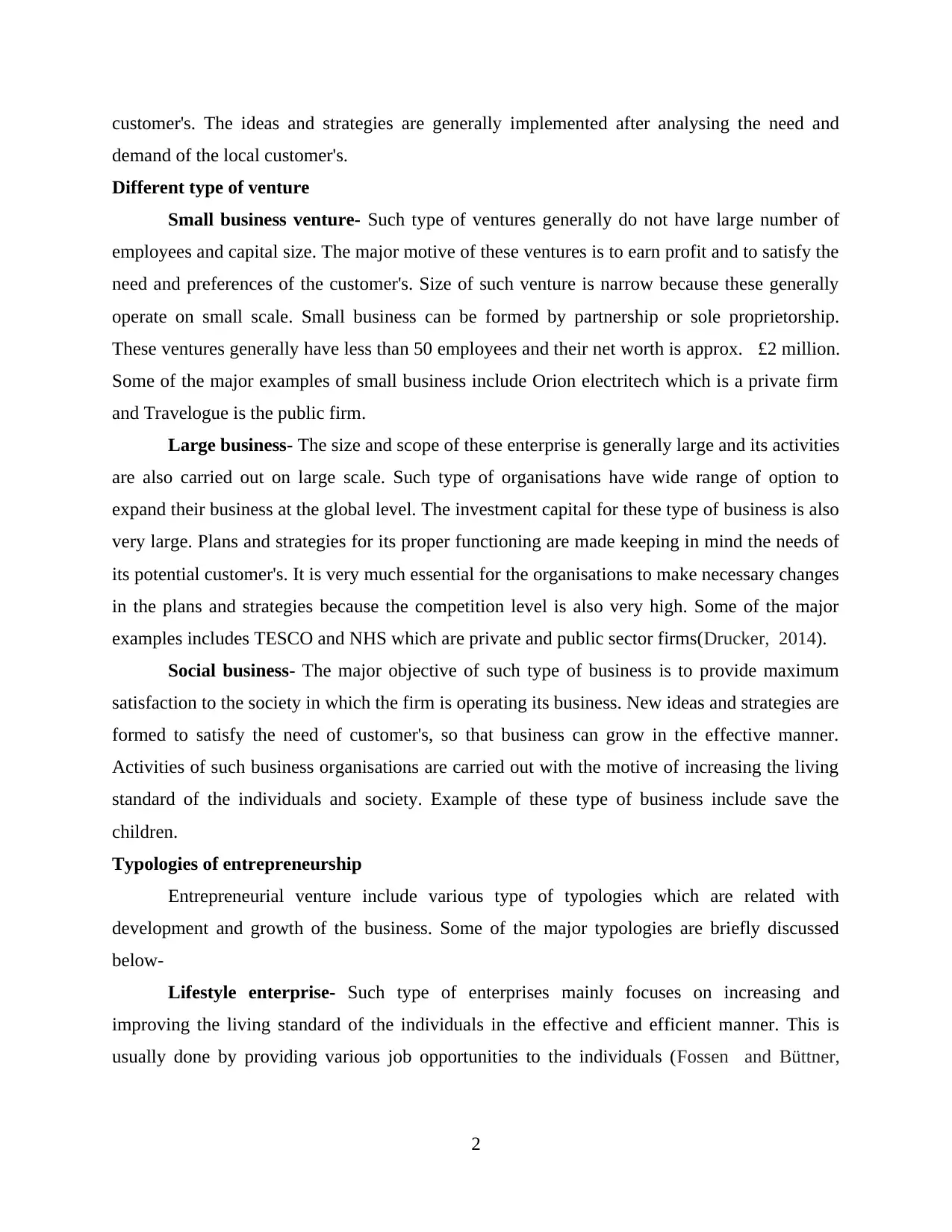
customer's. The ideas and strategies are generally implemented after analysing the need and
demand of the local customer's.
Different type of venture
Small business venture- Such type of ventures generally do not have large number of
employees and capital size. The major motive of these ventures is to earn profit and to satisfy the
need and preferences of the customer's. Size of such venture is narrow because these generally
operate on small scale. Small business can be formed by partnership or sole proprietorship.
These ventures generally have less than 50 employees and their net worth is approx. £2 million.
Some of the major examples of small business include Orion electritech which is a private firm
and Travelogue is the public firm.
Large business- The size and scope of these enterprise is generally large and its activities
are also carried out on large scale. Such type of organisations have wide range of option to
expand their business at the global level. The investment capital for these type of business is also
very large. Plans and strategies for its proper functioning are made keeping in mind the needs of
its potential customer's. It is very much essential for the organisations to make necessary changes
in the plans and strategies because the competition level is also very high. Some of the major
examples includes TESCO and NHS which are private and public sector firms(Drucker, 2014).
Social business- The major objective of such type of business is to provide maximum
satisfaction to the society in which the firm is operating its business. New ideas and strategies are
formed to satisfy the need of customer's, so that business can grow in the effective manner.
Activities of such business organisations are carried out with the motive of increasing the living
standard of the individuals and society. Example of these type of business include save the
children.
Typologies of entrepreneurship
Entrepreneurial venture include various type of typologies which are related with
development and growth of the business. Some of the major typologies are briefly discussed
below-
Lifestyle enterprise- Such type of enterprises mainly focuses on increasing and
improving the living standard of the individuals in the effective and efficient manner. This is
usually done by providing various job opportunities to the individuals (Fossen and Büttner,
2
demand of the local customer's.
Different type of venture
Small business venture- Such type of ventures generally do not have large number of
employees and capital size. The major motive of these ventures is to earn profit and to satisfy the
need and preferences of the customer's. Size of such venture is narrow because these generally
operate on small scale. Small business can be formed by partnership or sole proprietorship.
These ventures generally have less than 50 employees and their net worth is approx. £2 million.
Some of the major examples of small business include Orion electritech which is a private firm
and Travelogue is the public firm.
Large business- The size and scope of these enterprise is generally large and its activities
are also carried out on large scale. Such type of organisations have wide range of option to
expand their business at the global level. The investment capital for these type of business is also
very large. Plans and strategies for its proper functioning are made keeping in mind the needs of
its potential customer's. It is very much essential for the organisations to make necessary changes
in the plans and strategies because the competition level is also very high. Some of the major
examples includes TESCO and NHS which are private and public sector firms(Drucker, 2014).
Social business- The major objective of such type of business is to provide maximum
satisfaction to the society in which the firm is operating its business. New ideas and strategies are
formed to satisfy the need of customer's, so that business can grow in the effective manner.
Activities of such business organisations are carried out with the motive of increasing the living
standard of the individuals and society. Example of these type of business include save the
children.
Typologies of entrepreneurship
Entrepreneurial venture include various type of typologies which are related with
development and growth of the business. Some of the major typologies are briefly discussed
below-
Lifestyle enterprise- Such type of enterprises mainly focuses on increasing and
improving the living standard of the individuals in the effective and efficient manner. This is
usually done by providing various job opportunities to the individuals (Fossen and Büttner,
2
Paraphrase This Document
Need a fresh take? Get an instant paraphrase of this document with our AI Paraphraser
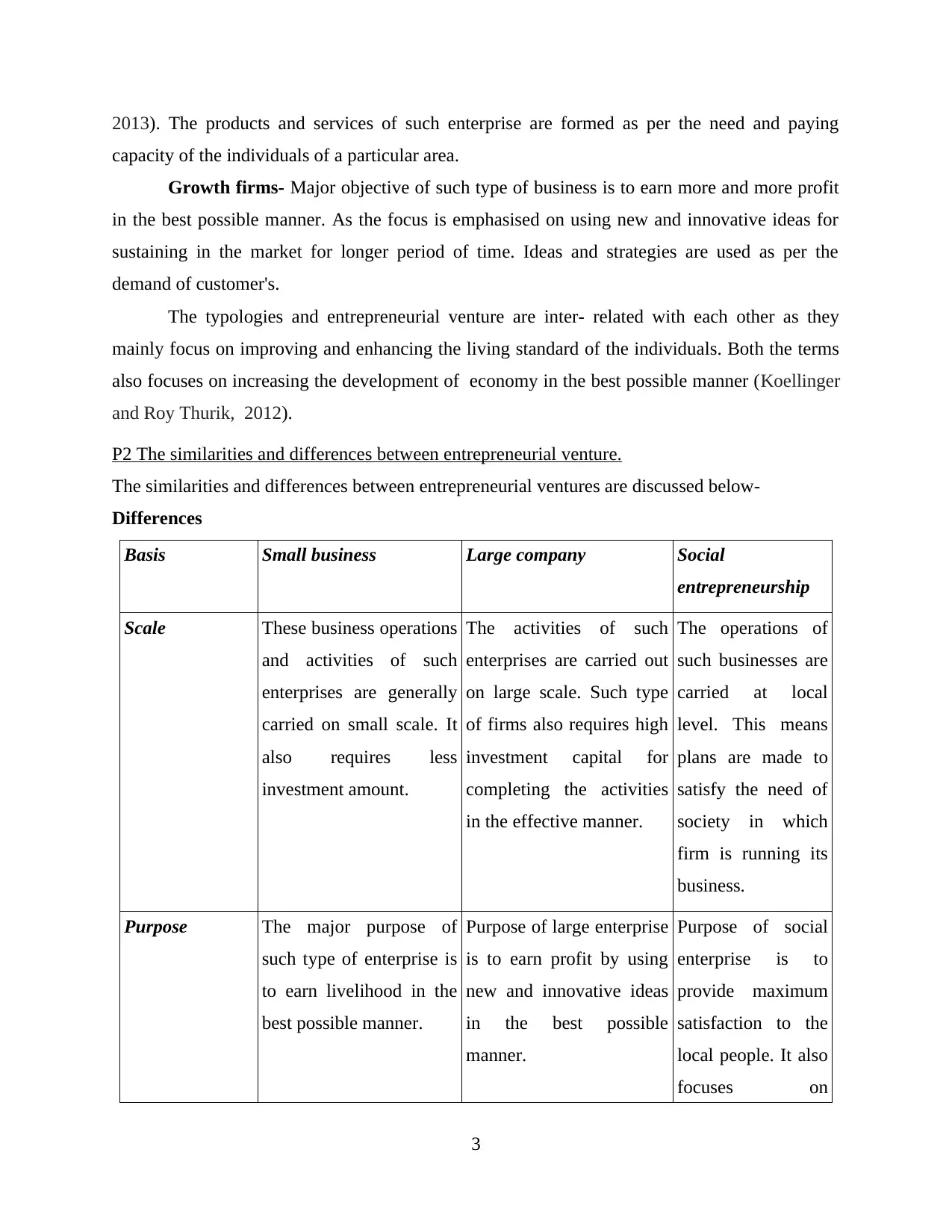
2013). The products and services of such enterprise are formed as per the need and paying
capacity of the individuals of a particular area.
Growth firms- Major objective of such type of business is to earn more and more profit
in the best possible manner. As the focus is emphasised on using new and innovative ideas for
sustaining in the market for longer period of time. Ideas and strategies are used as per the
demand of customer's.
The typologies and entrepreneurial venture are inter- related with each other as they
mainly focus on improving and enhancing the living standard of the individuals. Both the terms
also focuses on increasing the development of economy in the best possible manner (Koellinger
and Roy Thurik, 2012).
P2 The similarities and differences between entrepreneurial venture.
The similarities and differences between entrepreneurial ventures are discussed below-
Differences
Basis Small business Large company Social
entrepreneurship
Scale These business operations
and activities of such
enterprises are generally
carried on small scale. It
also requires less
investment amount.
The activities of such
enterprises are carried out
on large scale. Such type
of firms also requires high
investment capital for
completing the activities
in the effective manner.
The operations of
such businesses are
carried at local
level. This means
plans are made to
satisfy the need of
society in which
firm is running its
business.
Purpose The major purpose of
such type of enterprise is
to earn livelihood in the
best possible manner.
Purpose of large enterprise
is to earn profit by using
new and innovative ideas
in the best possible
manner.
Purpose of social
enterprise is to
provide maximum
satisfaction to the
local people. It also
focuses on
3
capacity of the individuals of a particular area.
Growth firms- Major objective of such type of business is to earn more and more profit
in the best possible manner. As the focus is emphasised on using new and innovative ideas for
sustaining in the market for longer period of time. Ideas and strategies are used as per the
demand of customer's.
The typologies and entrepreneurial venture are inter- related with each other as they
mainly focus on improving and enhancing the living standard of the individuals. Both the terms
also focuses on increasing the development of economy in the best possible manner (Koellinger
and Roy Thurik, 2012).
P2 The similarities and differences between entrepreneurial venture.
The similarities and differences between entrepreneurial ventures are discussed below-
Differences
Basis Small business Large company Social
entrepreneurship
Scale These business operations
and activities of such
enterprises are generally
carried on small scale. It
also requires less
investment amount.
The activities of such
enterprises are carried out
on large scale. Such type
of firms also requires high
investment capital for
completing the activities
in the effective manner.
The operations of
such businesses are
carried at local
level. This means
plans are made to
satisfy the need of
society in which
firm is running its
business.
Purpose The major purpose of
such type of enterprise is
to earn livelihood in the
best possible manner.
Purpose of large enterprise
is to earn profit by using
new and innovative ideas
in the best possible
manner.
Purpose of social
enterprise is to
provide maximum
satisfaction to the
local people. It also
focuses on
3
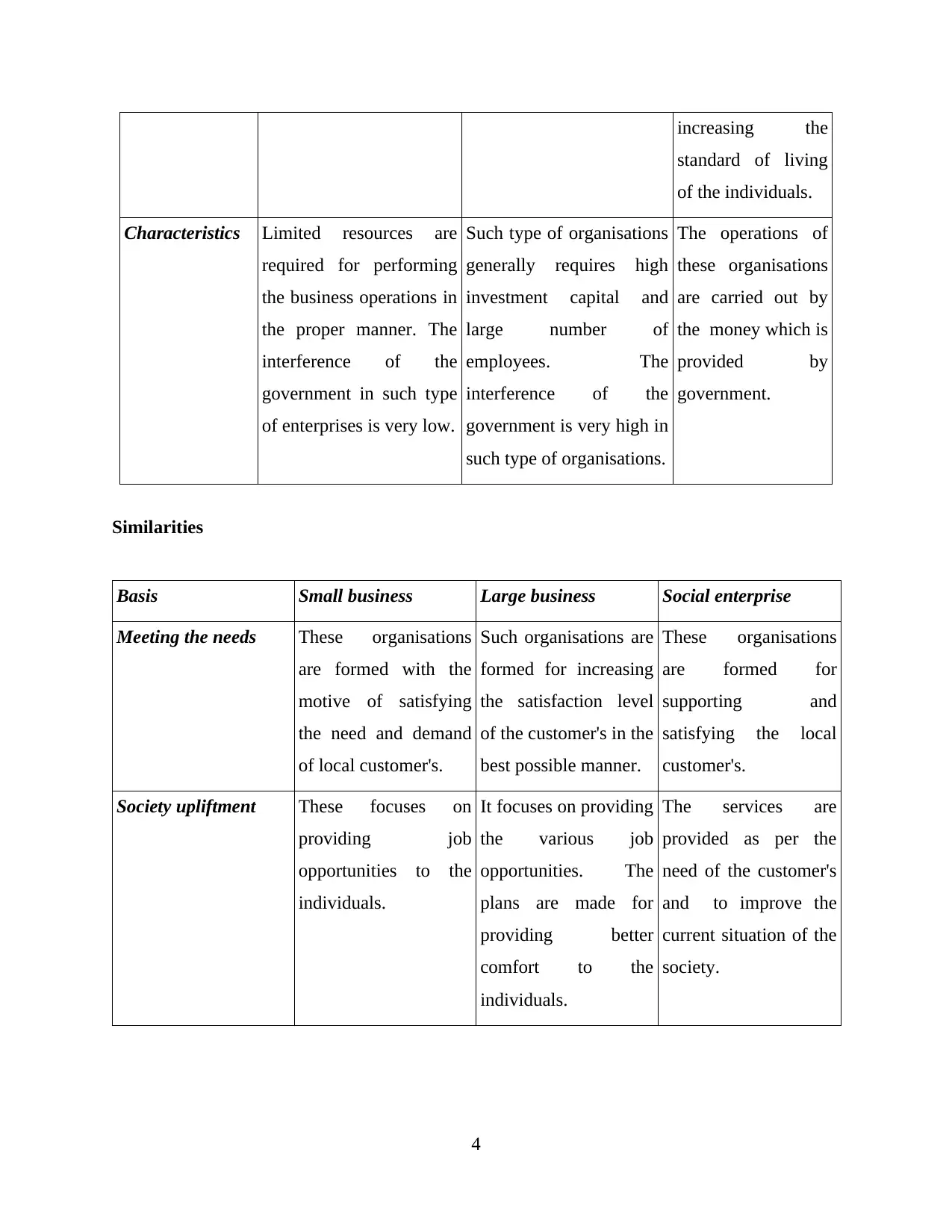
increasing the
standard of living
of the individuals.
Characteristics Limited resources are
required for performing
the business operations in
the proper manner. The
interference of the
government in such type
of enterprises is very low.
Such type of organisations
generally requires high
investment capital and
large number of
employees. The
interference of the
government is very high in
such type of organisations.
The operations of
these organisations
are carried out by
the money which is
provided by
government.
Similarities
Basis Small business Large business Social enterprise
Meeting the needs These organisations
are formed with the
motive of satisfying
the need and demand
of local customer's.
Such organisations are
formed for increasing
the satisfaction level
of the customer's in the
best possible manner.
These organisations
are formed for
supporting and
satisfying the local
customer's.
Society upliftment These focuses on
providing job
opportunities to the
individuals.
It focuses on providing
the various job
opportunities. The
plans are made for
providing better
comfort to the
individuals.
The services are
provided as per the
need of the customer's
and to improve the
current situation of the
society.
4
standard of living
of the individuals.
Characteristics Limited resources are
required for performing
the business operations in
the proper manner. The
interference of the
government in such type
of enterprises is very low.
Such type of organisations
generally requires high
investment capital and
large number of
employees. The
interference of the
government is very high in
such type of organisations.
The operations of
these organisations
are carried out by
the money which is
provided by
government.
Similarities
Basis Small business Large business Social enterprise
Meeting the needs These organisations
are formed with the
motive of satisfying
the need and demand
of local customer's.
Such organisations are
formed for increasing
the satisfaction level
of the customer's in the
best possible manner.
These organisations
are formed for
supporting and
satisfying the local
customer's.
Society upliftment These focuses on
providing job
opportunities to the
individuals.
It focuses on providing
the various job
opportunities. The
plans are made for
providing better
comfort to the
individuals.
The services are
provided as per the
need of the customer's
and to improve the
current situation of the
society.
4
⊘ This is a preview!⊘
Do you want full access?
Subscribe today to unlock all pages.

Trusted by 1+ million students worldwide
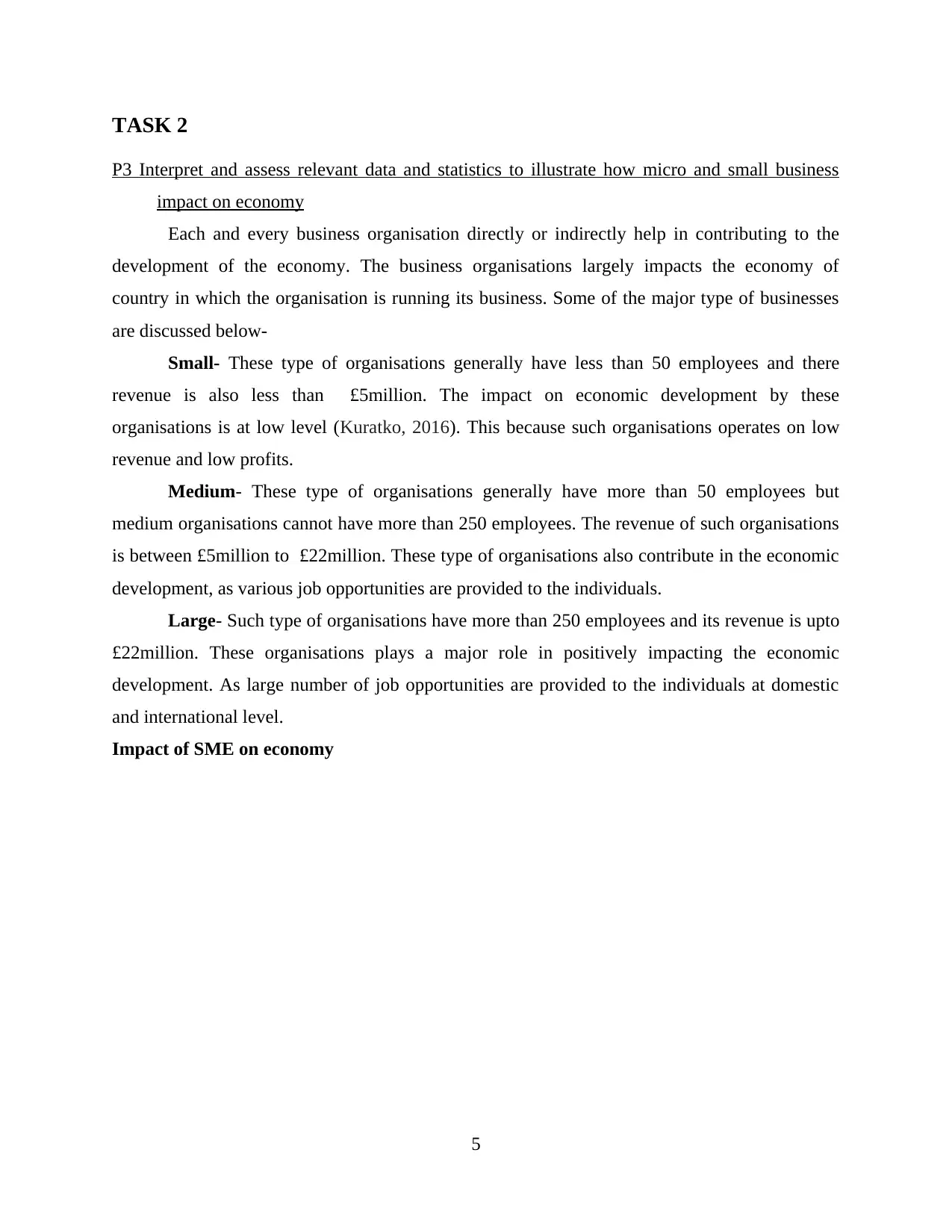
TASK 2
P3 Interpret and assess relevant data and statistics to illustrate how micro and small business
impact on economy
Each and every business organisation directly or indirectly help in contributing to the
development of the economy. The business organisations largely impacts the economy of
country in which the organisation is running its business. Some of the major type of businesses
are discussed below-
Small- These type of organisations generally have less than 50 employees and there
revenue is also less than £5million. The impact on economic development by these
organisations is at low level (Kuratko, 2016). This because such organisations operates on low
revenue and low profits.
Medium- These type of organisations generally have more than 50 employees but
medium organisations cannot have more than 250 employees. The revenue of such organisations
is between £5million to £22million. These type of organisations also contribute in the economic
development, as various job opportunities are provided to the individuals.
Large- Such type of organisations have more than 250 employees and its revenue is upto
£22million. These organisations plays a major role in positively impacting the economic
development. As large number of job opportunities are provided to the individuals at domestic
and international level.
Impact of SME on economy
5
P3 Interpret and assess relevant data and statistics to illustrate how micro and small business
impact on economy
Each and every business organisation directly or indirectly help in contributing to the
development of the economy. The business organisations largely impacts the economy of
country in which the organisation is running its business. Some of the major type of businesses
are discussed below-
Small- These type of organisations generally have less than 50 employees and there
revenue is also less than £5million. The impact on economic development by these
organisations is at low level (Kuratko, 2016). This because such organisations operates on low
revenue and low profits.
Medium- These type of organisations generally have more than 50 employees but
medium organisations cannot have more than 250 employees. The revenue of such organisations
is between £5million to £22million. These type of organisations also contribute in the economic
development, as various job opportunities are provided to the individuals.
Large- Such type of organisations have more than 250 employees and its revenue is upto
£22million. These organisations plays a major role in positively impacting the economic
development. As large number of job opportunities are provided to the individuals at domestic
and international level.
Impact of SME on economy
5
Paraphrase This Document
Need a fresh take? Get an instant paraphrase of this document with our AI Paraphraser
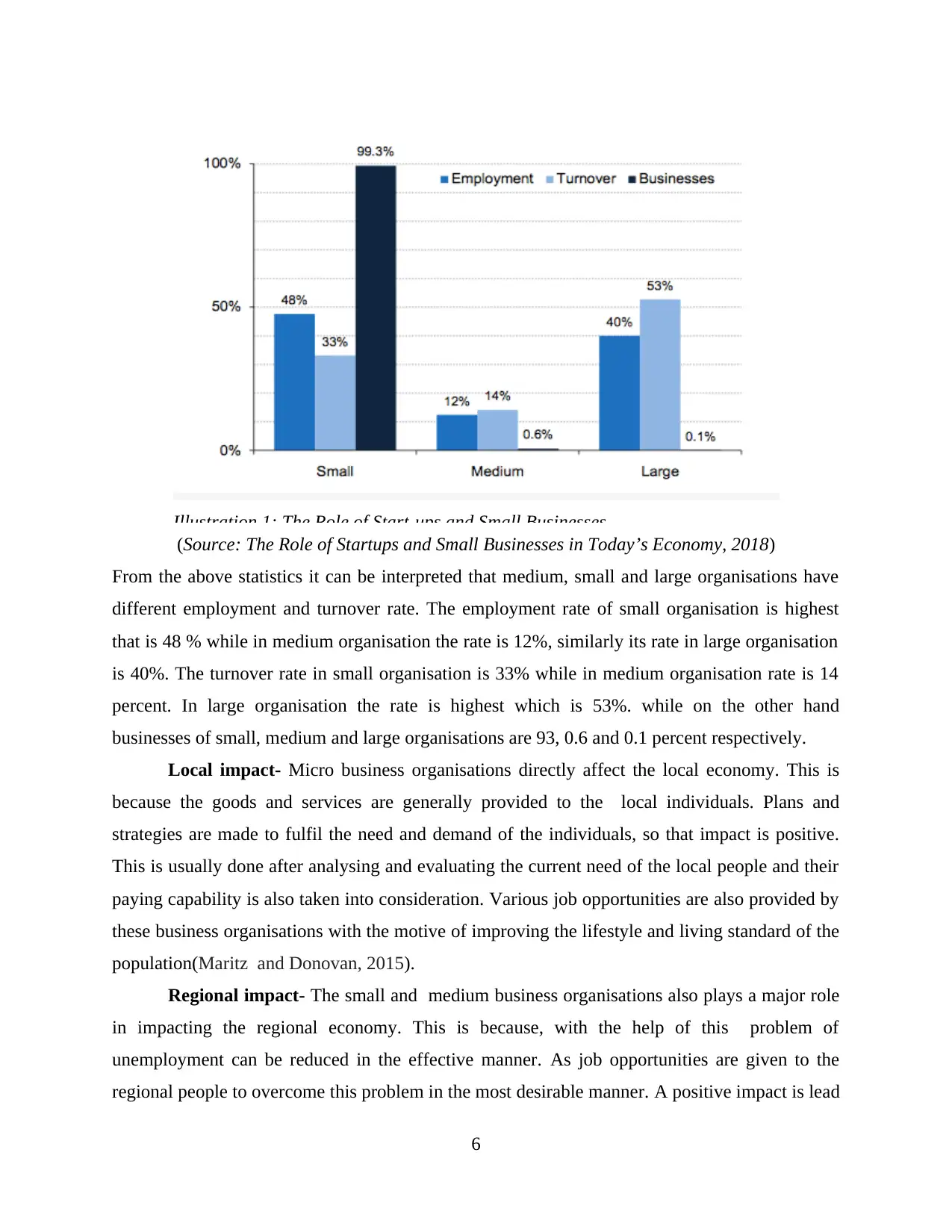
(Source: The Role of Startups and Small Businesses in Today’s Economy, 2018)
From the above statistics it can be interpreted that medium, small and large organisations have
different employment and turnover rate. The employment rate of small organisation is highest
that is 48 % while in medium organisation the rate is 12%, similarly its rate in large organisation
is 40%. The turnover rate in small organisation is 33% while in medium organisation rate is 14
percent. In large organisation the rate is highest which is 53%. while on the other hand
businesses of small, medium and large organisations are 93, 0.6 and 0.1 percent respectively.
Local impact- Micro business organisations directly affect the local economy. This is
because the goods and services are generally provided to the local individuals. Plans and
strategies are made to fulfil the need and demand of the individuals, so that impact is positive.
This is usually done after analysing and evaluating the current need of the local people and their
paying capability is also taken into consideration. Various job opportunities are also provided by
these business organisations with the motive of improving the lifestyle and living standard of the
population(Maritz and Donovan, 2015).
Regional impact- The small and medium business organisations also plays a major role
in impacting the regional economy. This is because, with the help of this problem of
unemployment can be reduced in the effective manner. As job opportunities are given to the
regional people to overcome this problem in the most desirable manner. A positive impact is lead
6
Illustration 1: The Role of Start-ups and Small Businesses
From the above statistics it can be interpreted that medium, small and large organisations have
different employment and turnover rate. The employment rate of small organisation is highest
that is 48 % while in medium organisation the rate is 12%, similarly its rate in large organisation
is 40%. The turnover rate in small organisation is 33% while in medium organisation rate is 14
percent. In large organisation the rate is highest which is 53%. while on the other hand
businesses of small, medium and large organisations are 93, 0.6 and 0.1 percent respectively.
Local impact- Micro business organisations directly affect the local economy. This is
because the goods and services are generally provided to the local individuals. Plans and
strategies are made to fulfil the need and demand of the individuals, so that impact is positive.
This is usually done after analysing and evaluating the current need of the local people and their
paying capability is also taken into consideration. Various job opportunities are also provided by
these business organisations with the motive of improving the lifestyle and living standard of the
population(Maritz and Donovan, 2015).
Regional impact- The small and medium business organisations also plays a major role
in impacting the regional economy. This is because, with the help of this problem of
unemployment can be reduced in the effective manner. As job opportunities are given to the
regional people to overcome this problem in the most desirable manner. A positive impact is lead
6
Illustration 1: The Role of Start-ups and Small Businesses
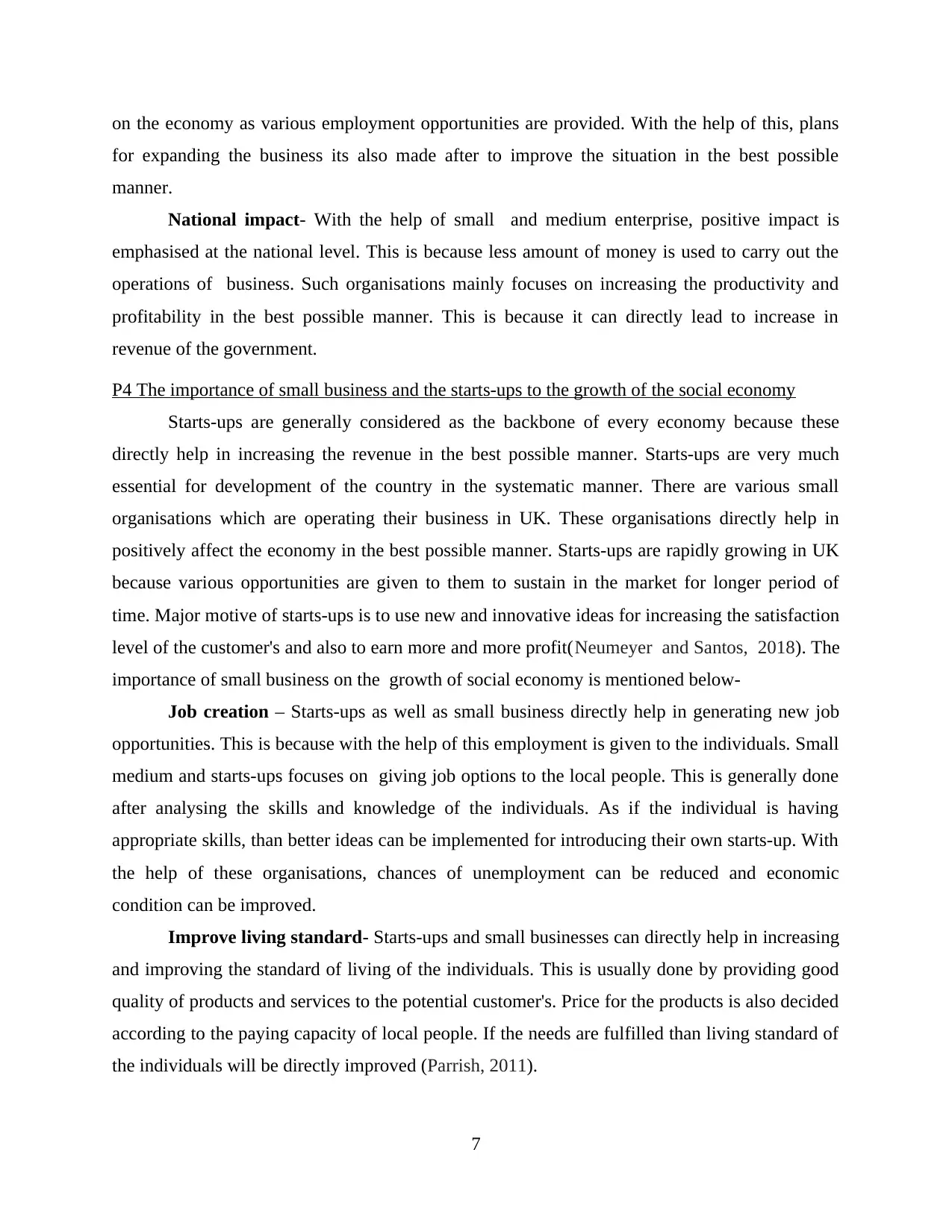
on the economy as various employment opportunities are provided. With the help of this, plans
for expanding the business its also made after to improve the situation in the best possible
manner.
National impact- With the help of small and medium enterprise, positive impact is
emphasised at the national level. This is because less amount of money is used to carry out the
operations of business. Such organisations mainly focuses on increasing the productivity and
profitability in the best possible manner. This is because it can directly lead to increase in
revenue of the government.
P4 The importance of small business and the starts-ups to the growth of the social economy
Starts-ups are generally considered as the backbone of every economy because these
directly help in increasing the revenue in the best possible manner. Starts-ups are very much
essential for development of the country in the systematic manner. There are various small
organisations which are operating their business in UK. These organisations directly help in
positively affect the economy in the best possible manner. Starts-ups are rapidly growing in UK
because various opportunities are given to them to sustain in the market for longer period of
time. Major motive of starts-ups is to use new and innovative ideas for increasing the satisfaction
level of the customer's and also to earn more and more profit(Neumeyer and Santos, 2018). The
importance of small business on the growth of social economy is mentioned below-
Job creation – Starts-ups as well as small business directly help in generating new job
opportunities. This is because with the help of this employment is given to the individuals. Small
medium and starts-ups focuses on giving job options to the local people. This is generally done
after analysing the skills and knowledge of the individuals. As if the individual is having
appropriate skills, than better ideas can be implemented for introducing their own starts-up. With
the help of these organisations, chances of unemployment can be reduced and economic
condition can be improved.
Improve living standard- Starts-ups and small businesses can directly help in increasing
and improving the standard of living of the individuals. This is usually done by providing good
quality of products and services to the potential customer's. Price for the products is also decided
according to the paying capacity of local people. If the needs are fulfilled than living standard of
the individuals will be directly improved (Parrish, 2011).
7
for expanding the business its also made after to improve the situation in the best possible
manner.
National impact- With the help of small and medium enterprise, positive impact is
emphasised at the national level. This is because less amount of money is used to carry out the
operations of business. Such organisations mainly focuses on increasing the productivity and
profitability in the best possible manner. This is because it can directly lead to increase in
revenue of the government.
P4 The importance of small business and the starts-ups to the growth of the social economy
Starts-ups are generally considered as the backbone of every economy because these
directly help in increasing the revenue in the best possible manner. Starts-ups are very much
essential for development of the country in the systematic manner. There are various small
organisations which are operating their business in UK. These organisations directly help in
positively affect the economy in the best possible manner. Starts-ups are rapidly growing in UK
because various opportunities are given to them to sustain in the market for longer period of
time. Major motive of starts-ups is to use new and innovative ideas for increasing the satisfaction
level of the customer's and also to earn more and more profit(Neumeyer and Santos, 2018). The
importance of small business on the growth of social economy is mentioned below-
Job creation – Starts-ups as well as small business directly help in generating new job
opportunities. This is because with the help of this employment is given to the individuals. Small
medium and starts-ups focuses on giving job options to the local people. This is generally done
after analysing the skills and knowledge of the individuals. As if the individual is having
appropriate skills, than better ideas can be implemented for introducing their own starts-up. With
the help of these organisations, chances of unemployment can be reduced and economic
condition can be improved.
Improve living standard- Starts-ups and small businesses can directly help in increasing
and improving the standard of living of the individuals. This is usually done by providing good
quality of products and services to the potential customer's. Price for the products is also decided
according to the paying capacity of local people. If the needs are fulfilled than living standard of
the individuals will be directly improved (Parrish, 2011).
7
⊘ This is a preview!⊘
Do you want full access?
Subscribe today to unlock all pages.

Trusted by 1+ million students worldwide
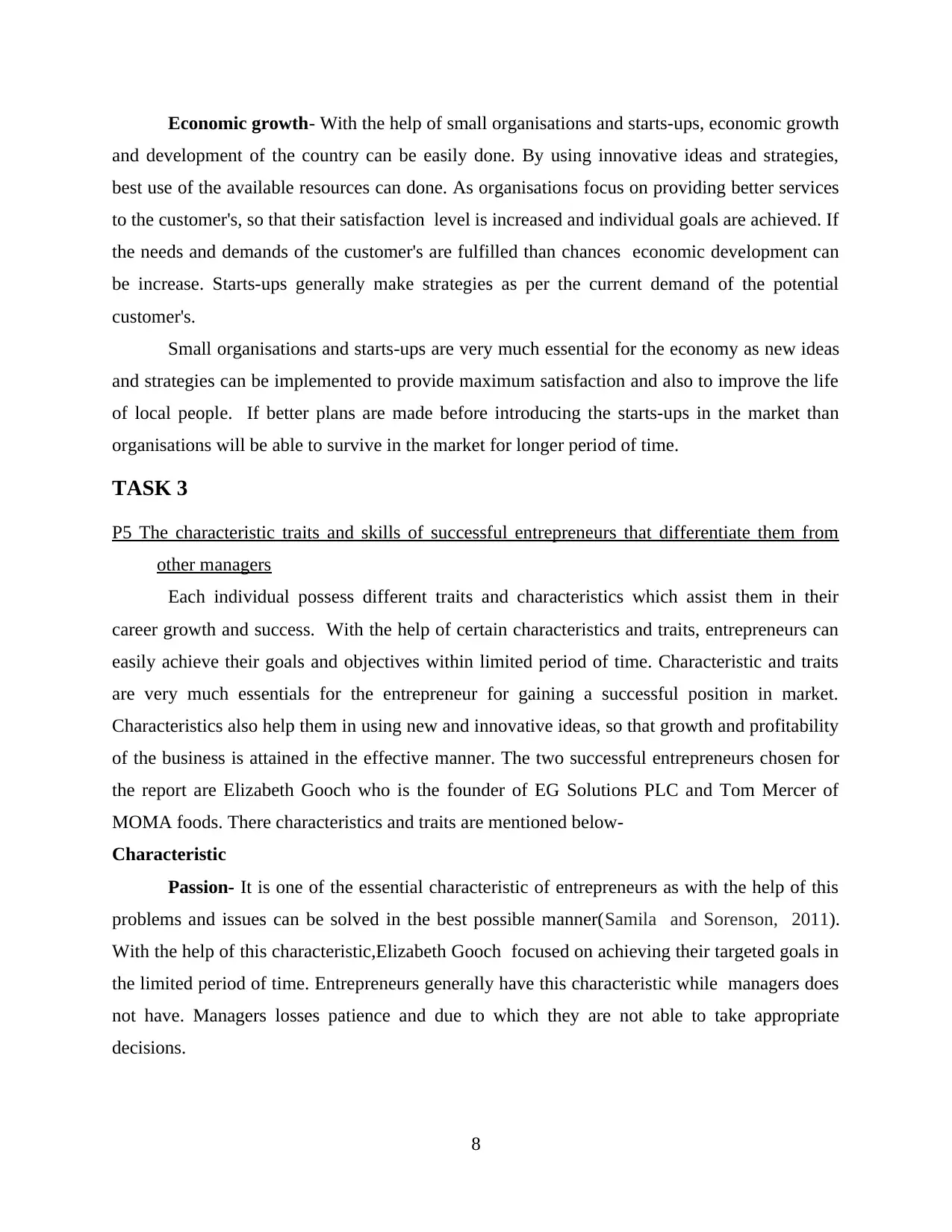
Economic growth- With the help of small organisations and starts-ups, economic growth
and development of the country can be easily done. By using innovative ideas and strategies,
best use of the available resources can done. As organisations focus on providing better services
to the customer's, so that their satisfaction level is increased and individual goals are achieved. If
the needs and demands of the customer's are fulfilled than chances economic development can
be increase. Starts-ups generally make strategies as per the current demand of the potential
customer's.
Small organisations and starts-ups are very much essential for the economy as new ideas
and strategies can be implemented to provide maximum satisfaction and also to improve the life
of local people. If better plans are made before introducing the starts-ups in the market than
organisations will be able to survive in the market for longer period of time.
TASK 3
P5 The characteristic traits and skills of successful entrepreneurs that differentiate them from
other managers
Each individual possess different traits and characteristics which assist them in their
career growth and success. With the help of certain characteristics and traits, entrepreneurs can
easily achieve their goals and objectives within limited period of time. Characteristic and traits
are very much essentials for the entrepreneur for gaining a successful position in market.
Characteristics also help them in using new and innovative ideas, so that growth and profitability
of the business is attained in the effective manner. The two successful entrepreneurs chosen for
the report are Elizabeth Gooch who is the founder of EG Solutions PLC and Tom Mercer of
MOMA foods. There characteristics and traits are mentioned below-
Characteristic
Passion- It is one of the essential characteristic of entrepreneurs as with the help of this
problems and issues can be solved in the best possible manner(Samila and Sorenson, 2011).
With the help of this characteristic,Elizabeth Gooch focused on achieving their targeted goals in
the limited period of time. Entrepreneurs generally have this characteristic while managers does
not have. Managers losses patience and due to which they are not able to take appropriate
decisions.
8
and development of the country can be easily done. By using innovative ideas and strategies,
best use of the available resources can done. As organisations focus on providing better services
to the customer's, so that their satisfaction level is increased and individual goals are achieved. If
the needs and demands of the customer's are fulfilled than chances economic development can
be increase. Starts-ups generally make strategies as per the current demand of the potential
customer's.
Small organisations and starts-ups are very much essential for the economy as new ideas
and strategies can be implemented to provide maximum satisfaction and also to improve the life
of local people. If better plans are made before introducing the starts-ups in the market than
organisations will be able to survive in the market for longer period of time.
TASK 3
P5 The characteristic traits and skills of successful entrepreneurs that differentiate them from
other managers
Each individual possess different traits and characteristics which assist them in their
career growth and success. With the help of certain characteristics and traits, entrepreneurs can
easily achieve their goals and objectives within limited period of time. Characteristic and traits
are very much essentials for the entrepreneur for gaining a successful position in market.
Characteristics also help them in using new and innovative ideas, so that growth and profitability
of the business is attained in the effective manner. The two successful entrepreneurs chosen for
the report are Elizabeth Gooch who is the founder of EG Solutions PLC and Tom Mercer of
MOMA foods. There characteristics and traits are mentioned below-
Characteristic
Passion- It is one of the essential characteristic of entrepreneurs as with the help of this
problems and issues can be solved in the best possible manner(Samila and Sorenson, 2011).
With the help of this characteristic,Elizabeth Gooch focused on achieving their targeted goals in
the limited period of time. Entrepreneurs generally have this characteristic while managers does
not have. Managers losses patience and due to which they are not able to take appropriate
decisions.
8
Paraphrase This Document
Need a fresh take? Get an instant paraphrase of this document with our AI Paraphraser
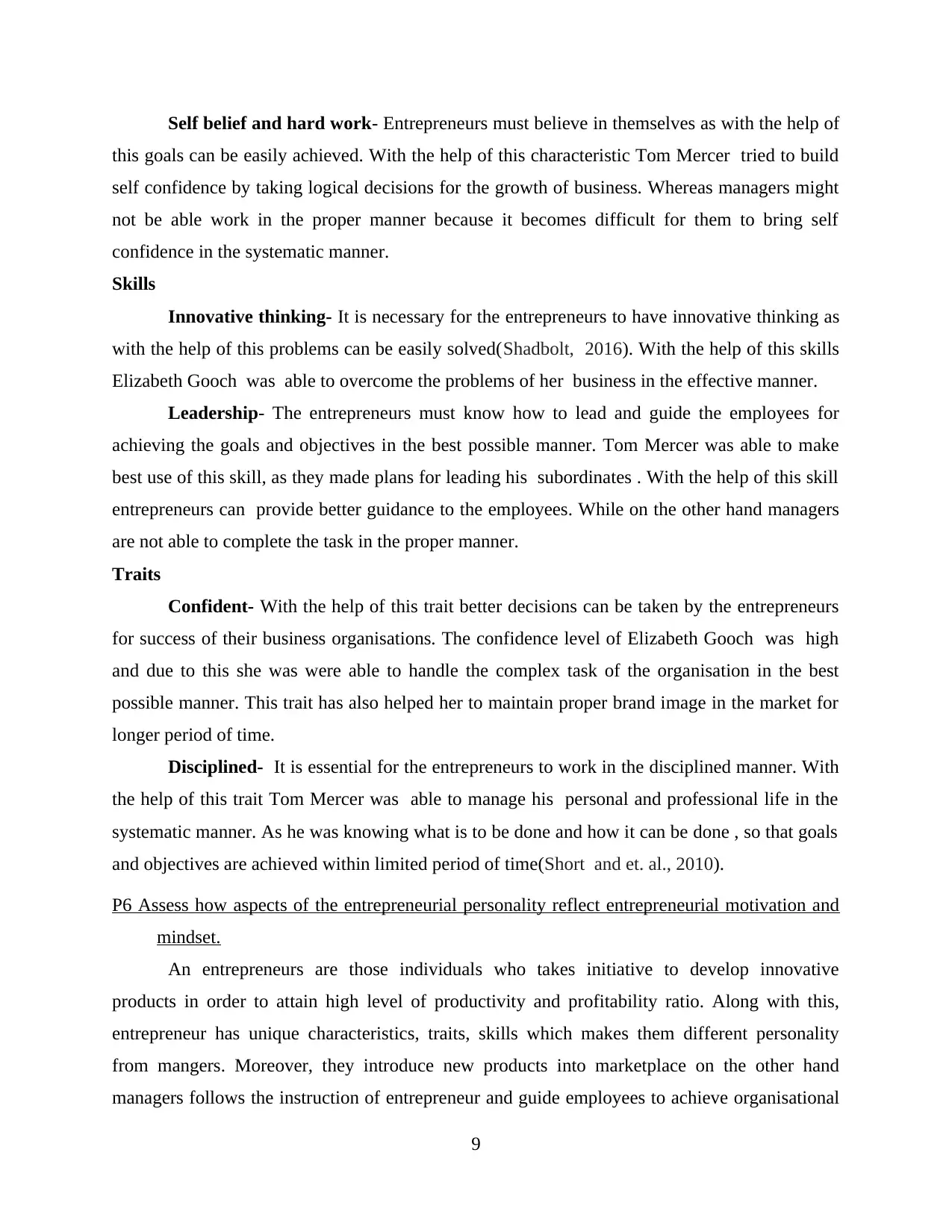
Self belief and hard work- Entrepreneurs must believe in themselves as with the help of
this goals can be easily achieved. With the help of this characteristic Tom Mercer tried to build
self confidence by taking logical decisions for the growth of business. Whereas managers might
not be able work in the proper manner because it becomes difficult for them to bring self
confidence in the systematic manner.
Skills
Innovative thinking- It is necessary for the entrepreneurs to have innovative thinking as
with the help of this problems can be easily solved(Shadbolt, 2016). With the help of this skills
Elizabeth Gooch was able to overcome the problems of her business in the effective manner.
Leadership- The entrepreneurs must know how to lead and guide the employees for
achieving the goals and objectives in the best possible manner. Tom Mercer was able to make
best use of this skill, as they made plans for leading his subordinates . With the help of this skill
entrepreneurs can provide better guidance to the employees. While on the other hand managers
are not able to complete the task in the proper manner.
Traits
Confident- With the help of this trait better decisions can be taken by the entrepreneurs
for success of their business organisations. The confidence level of Elizabeth Gooch was high
and due to this she was were able to handle the complex task of the organisation in the best
possible manner. This trait has also helped her to maintain proper brand image in the market for
longer period of time.
Disciplined- It is essential for the entrepreneurs to work in the disciplined manner. With
the help of this trait Tom Mercer was able to manage his personal and professional life in the
systematic manner. As he was knowing what is to be done and how it can be done , so that goals
and objectives are achieved within limited period of time(Short and et. al., 2010).
P6 Assess how aspects of the entrepreneurial personality reflect entrepreneurial motivation and
mindset.
An entrepreneurs are those individuals who takes initiative to develop innovative
products in order to attain high level of productivity and profitability ratio. Along with this,
entrepreneur has unique characteristics, traits, skills which makes them different personality
from mangers. Moreover, they introduce new products into marketplace on the other hand
managers follows the instruction of entrepreneur and guide employees to achieve organisational
9
this goals can be easily achieved. With the help of this characteristic Tom Mercer tried to build
self confidence by taking logical decisions for the growth of business. Whereas managers might
not be able work in the proper manner because it becomes difficult for them to bring self
confidence in the systematic manner.
Skills
Innovative thinking- It is necessary for the entrepreneurs to have innovative thinking as
with the help of this problems can be easily solved(Shadbolt, 2016). With the help of this skills
Elizabeth Gooch was able to overcome the problems of her business in the effective manner.
Leadership- The entrepreneurs must know how to lead and guide the employees for
achieving the goals and objectives in the best possible manner. Tom Mercer was able to make
best use of this skill, as they made plans for leading his subordinates . With the help of this skill
entrepreneurs can provide better guidance to the employees. While on the other hand managers
are not able to complete the task in the proper manner.
Traits
Confident- With the help of this trait better decisions can be taken by the entrepreneurs
for success of their business organisations. The confidence level of Elizabeth Gooch was high
and due to this she was were able to handle the complex task of the organisation in the best
possible manner. This trait has also helped her to maintain proper brand image in the market for
longer period of time.
Disciplined- It is essential for the entrepreneurs to work in the disciplined manner. With
the help of this trait Tom Mercer was able to manage his personal and professional life in the
systematic manner. As he was knowing what is to be done and how it can be done , so that goals
and objectives are achieved within limited period of time(Short and et. al., 2010).
P6 Assess how aspects of the entrepreneurial personality reflect entrepreneurial motivation and
mindset.
An entrepreneurs are those individuals who takes initiative to develop innovative
products in order to attain high level of productivity and profitability ratio. Along with this,
entrepreneur has unique characteristics, traits, skills which makes them different personality
from mangers. Moreover, they introduce new products into marketplace on the other hand
managers follows the instruction of entrepreneur and guide employees to achieve organisational
9
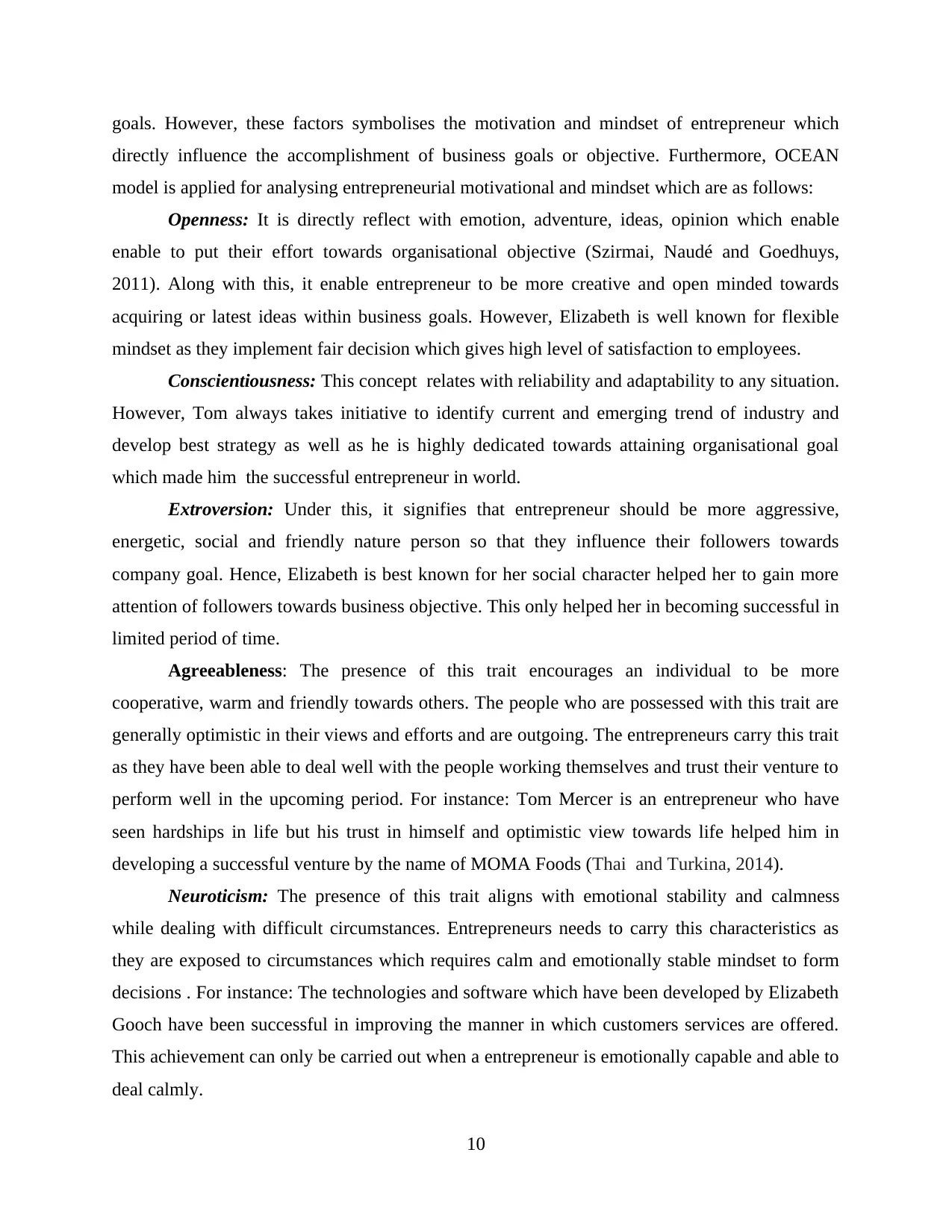
goals. However, these factors symbolises the motivation and mindset of entrepreneur which
directly influence the accomplishment of business goals or objective. Furthermore, OCEAN
model is applied for analysing entrepreneurial motivational and mindset which are as follows:
Openness: It is directly reflect with emotion, adventure, ideas, opinion which enable
enable to put their effort towards organisational objective (Szirmai, Naudé and Goedhuys,
2011). Along with this, it enable entrepreneur to be more creative and open minded towards
acquiring or latest ideas within business goals. However, Elizabeth is well known for flexible
mindset as they implement fair decision which gives high level of satisfaction to employees.
Conscientiousness: This concept relates with reliability and adaptability to any situation.
However, Tom always takes initiative to identify current and emerging trend of industry and
develop best strategy as well as he is highly dedicated towards attaining organisational goal
which made him the successful entrepreneur in world.
Extroversion: Under this, it signifies that entrepreneur should be more aggressive,
energetic, social and friendly nature person so that they influence their followers towards
company goal. Hence, Elizabeth is best known for her social character helped her to gain more
attention of followers towards business objective. This only helped her in becoming successful in
limited period of time.
Agreeableness: The presence of this trait encourages an individual to be more
cooperative, warm and friendly towards others. The people who are possessed with this trait are
generally optimistic in their views and efforts and are outgoing. The entrepreneurs carry this trait
as they have been able to deal well with the people working themselves and trust their venture to
perform well in the upcoming period. For instance: Tom Mercer is an entrepreneur who have
seen hardships in life but his trust in himself and optimistic view towards life helped him in
developing a successful venture by the name of MOMA Foods (Thai and Turkina, 2014).
Neuroticism: The presence of this trait aligns with emotional stability and calmness
while dealing with difficult circumstances. Entrepreneurs needs to carry this characteristics as
they are exposed to circumstances which requires calm and emotionally stable mindset to form
decisions . For instance: The technologies and software which have been developed by Elizabeth
Gooch have been successful in improving the manner in which customers services are offered.
This achievement can only be carried out when a entrepreneur is emotionally capable and able to
deal calmly.
10
directly influence the accomplishment of business goals or objective. Furthermore, OCEAN
model is applied for analysing entrepreneurial motivational and mindset which are as follows:
Openness: It is directly reflect with emotion, adventure, ideas, opinion which enable
enable to put their effort towards organisational objective (Szirmai, Naudé and Goedhuys,
2011). Along with this, it enable entrepreneur to be more creative and open minded towards
acquiring or latest ideas within business goals. However, Elizabeth is well known for flexible
mindset as they implement fair decision which gives high level of satisfaction to employees.
Conscientiousness: This concept relates with reliability and adaptability to any situation.
However, Tom always takes initiative to identify current and emerging trend of industry and
develop best strategy as well as he is highly dedicated towards attaining organisational goal
which made him the successful entrepreneur in world.
Extroversion: Under this, it signifies that entrepreneur should be more aggressive,
energetic, social and friendly nature person so that they influence their followers towards
company goal. Hence, Elizabeth is best known for her social character helped her to gain more
attention of followers towards business objective. This only helped her in becoming successful in
limited period of time.
Agreeableness: The presence of this trait encourages an individual to be more
cooperative, warm and friendly towards others. The people who are possessed with this trait are
generally optimistic in their views and efforts and are outgoing. The entrepreneurs carry this trait
as they have been able to deal well with the people working themselves and trust their venture to
perform well in the upcoming period. For instance: Tom Mercer is an entrepreneur who have
seen hardships in life but his trust in himself and optimistic view towards life helped him in
developing a successful venture by the name of MOMA Foods (Thai and Turkina, 2014).
Neuroticism: The presence of this trait aligns with emotional stability and calmness
while dealing with difficult circumstances. Entrepreneurs needs to carry this characteristics as
they are exposed to circumstances which requires calm and emotionally stable mindset to form
decisions . For instance: The technologies and software which have been developed by Elizabeth
Gooch have been successful in improving the manner in which customers services are offered.
This achievement can only be carried out when a entrepreneur is emotionally capable and able to
deal calmly.
10
⊘ This is a preview!⊘
Do you want full access?
Subscribe today to unlock all pages.

Trusted by 1+ million students worldwide
1 out of 15
Related Documents
Your All-in-One AI-Powered Toolkit for Academic Success.
+13062052269
info@desklib.com
Available 24*7 on WhatsApp / Email
![[object Object]](/_next/static/media/star-bottom.7253800d.svg)
Unlock your academic potential
Copyright © 2020–2026 A2Z Services. All Rights Reserved. Developed and managed by ZUCOL.




